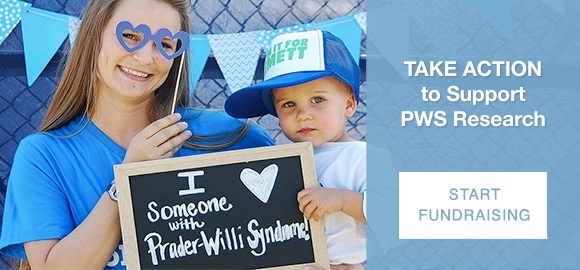A special contribution by guest blogger Lisa Matesevac
This summer, my family made our annual 15-hour trek to visit family in Buffalo, NY. This was a much-needed reprieve for our family as Evan, our teenage son with PWS, was recovering from recent spinal fusion surgery and adjusting to life without Carbetocin.
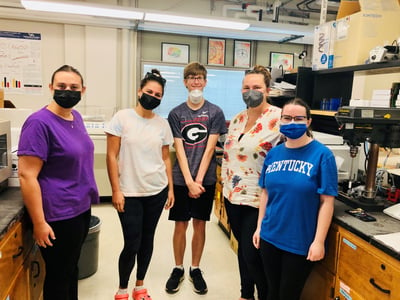 While there, I remembered that when I served as an advocate reviewer for FPWR I learned of some PWS research being conducted at the University of Buffalo (UB). I decided at that moment that I would take a leap and contact the researcher to ask if we could come to the lab to meet the team and see firsthand where donor dollars were making a difference.
While there, I remembered that when I served as an advocate reviewer for FPWR I learned of some PWS research being conducted at the University of Buffalo (UB). I decided at that moment that I would take a leap and contact the researcher to ask if we could come to the lab to meet the team and see firsthand where donor dollars were making a difference.
Nervously, I typed out my email with an introduction to myself and my son requesting a visit to meet the team in person. To my delight, Dr. Mietlicki-Baase responded swiftly and with excitement, extending an invitation for us to visit!
I had no expectations as we drove to the lab a few days later, but I knew this was the pick me up we needed to fuel our hope! When we arrived, Dr. Mietlicki-Baase met us outside. She seemed equally as excited to meet us as we were to meet her. She outlined a schedule of events that included us meeting her team of researchers and touring the lab.
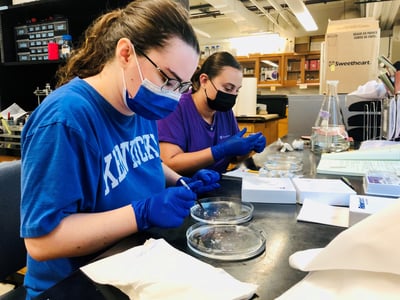
We began our tour by learning more about the critical PWS research being performed at UB in which the team is using MAGEL2 deficient rats to study neural responses to satiation signals in a part of the brain that controls energy balance as well as examining key appetite hormones. Dr. Mietlicki-Baase gave generously of her time, explaining the research to Evan in a way that was meaningful to him. She drew pictures of the part of the brain she was studying providing a visual guide to aid in understanding.
We later got to see preserved brains from the study animals and dissections that were done. We learned about an area of the hindbrain called the Nucleus Tractus Solitarius (NTS) located at the base of the brain and how it plays a critical role in satiety because it is the first place in the brain that information from the periphery of the body is received. So, for example, when neural information from the stomach is transmitted this is the first place in the brain that receives this information. Dr. Mietlicki-Baase explained that her study is focused on how our eating related signals activate this area of the brain and specifically how it is different in PWS.
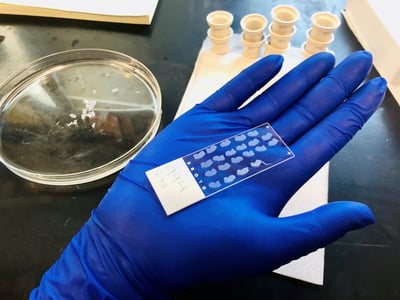
Next, we donned some paper lab coats and got an up close and personal visit with some friendly rats. Being the animal lover that he is, this was far and away Evan’s favorite part of the visit! We learned about their lifecycle, their eating habits, guidelines for ethical treatment of the rats, and how quickly they grow and reproduce.
Fun fact … rats have about 10-12 pups on average! We were given an overview of the specialized equipment used to conduct the experiments, including the Lickometer and Feedometer, which measure, obviously enough, the licking and feeding behaviors of the rats. Next, we went to the part of the lab where the brain dissections were being meticulously placed one by one onto slides to be examined under microscopes.
To round out our visit, we spent time with the research team and welcomed their questions about what it was like living with PWS. Not surprisingly, no one on the team had ever met a person with PWS before and they were excited to have the opportunity to learn more about life with PWS.
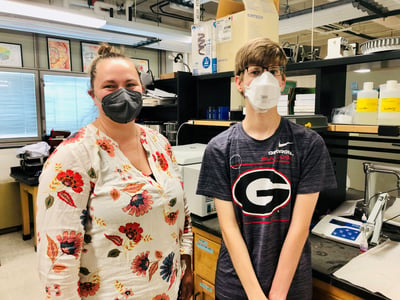
They were curious about the multitude of challenges of daily living, average age of diagnosis, what it is like to participate in a clinical trial and Evan’s typical diet. Evan shared his love of brisket and meeting up with friends who have PWS when doing clinical trials as well as his disdain for drinking water. We talked about his enjoyment of sports, hiking and animals and Evan swapped horse riding stories with Adrianne, one of the long-standing members of the team.
Our family is so very thankful to Dr. Mietlicki-Baase and her team for not only dedicating their time and talent to researching one of the greatest challenges of PWS but also for the incredibly warm welcome and genuine interest expressed for what it is like to be a person with PWS. As a parent, it was reinvigorating to visit this team of researchers who are working diligently every day to make discoveries about PWS!
I hope our visit motivates them to delve further into PWS research knowing that they are making a meaningful impact on Evan’s life and the lives and everyone with PWS. And who knows…they may just make an appearance at our next One Small Step event in Western NY in July 2023 where we can celebrate them like the rockstars they are! In the meantime, I will look forward to their presentations at the 2022 Annual Research Symposium in Chicago!




